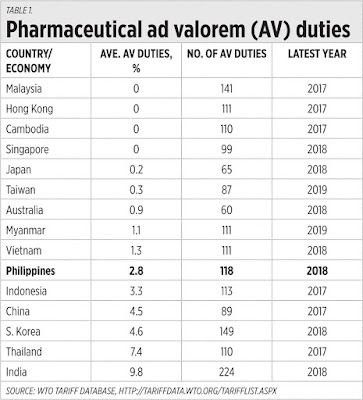* This is my article in BusinessWorld last September 19, 2019.
----------------
See also:
Among the ironies of government health policies
regardless of administration is their cry for “cheaper medicines” — and then
they impose various tariff and taxes on medicines that make these products more
expensive.
I checked the tariff and duties for imported
pharmaceutical products at the World Trade Organization (WTO) and I was
surprised to see that zero tariff in medicines is imposed by a number of our
neighbors in the region while the Philippines imposes a nearly 3% tariff, aside
from 12% VAT on medicines (See Table 1).
Other countries have higher medicine tariffs: Nepal has
14%, Pakistan 11%, Laos 10%.
This coming Monday, Sept. 23, there will be a UN
High-Level Meeting (UN HLM) on Universal Health Coverage (UHC). Their theme is
“Universal Health Coverage: Moving Together to Build a Healthier World.”
The UN and WHO send this virtue signaling to
member-country governments to further raise taxes, impose more prohibitions and
restrictions on “unhealthy” products to achieve a “healthier world.” So that
the Philippines’ Department of Health, Department of Finance, other agencies
create new legislations and regulations to implement this signaling.
But people around the world have been living healthier
and longer, even before UHC was coined and before various taxes or tax hikes on
alcohol, tobacco, sugary drinks and food were imposed (See Table 2).
Related to this, a new report was released this week,
“Accelerating access to medicines: Policy recommendations for achieving the
health-related Sustainable Development Goals.” It was produced and co-signed by
15 independent and non-government think tanks from 14 countries including the
Geneva Network (UK), Minimal Government Thinkers (Philippines), and four others
from Asia.
The report has noted that government itself is among the
causes of expensive medicines and thus recommended three ways to reduce
medicine costs: reduce taxes, abolish tariffs, and eradicate other trade
barriers. In particular, it recommended that “Non-members should join the WTO
Pharmaceutical Tariff Elimination Agreement (‘Zero for Zero’ initiative). If
this is not possible, countries that still levy tariffs should unilaterally
abolish them.” Yes, the Philippines should reduce its double talk by cutting
its pharmaceutical tariffs of 2.8% to zero (See Table 1 again).
Regarding improving access to medicines, the report also
noted that government itself creates regulations that in the process delay or
limit access to medicines by the people. Thus, the report made four
recommendations: Speed up patent examination, simplify the drug approval
process, modernize government medicine reimbursement decision-making, and
promote open trade in medicines.
Open trade in medicines means allowing more market
competition via: (1) a stronger role for the WTO in enforcing existing laws vs.
mandatory local content requirements; (2) instead of protectionism, developing
country governments should make their economies more attractive to foreign
investment by among others, investing in human capital and physical
infrastructure; and, (3) public procurement of medicines should be transparent,
ensure best interests of the taxpayers.
As this column has repeatedly argued, cheaper products
like energy, rice, transportation, healthcare and medicines is possible if
government steps back via less taxes and tariff, less mandates and
prohibitions, have more competition among producers and sellers of these goods
and services. Government should only ensure good quality commodities from
competing players by heavily penalizing producers of fake, counterfeit, substandard,
and unreliable products.
See also:



No comments:
Post a Comment